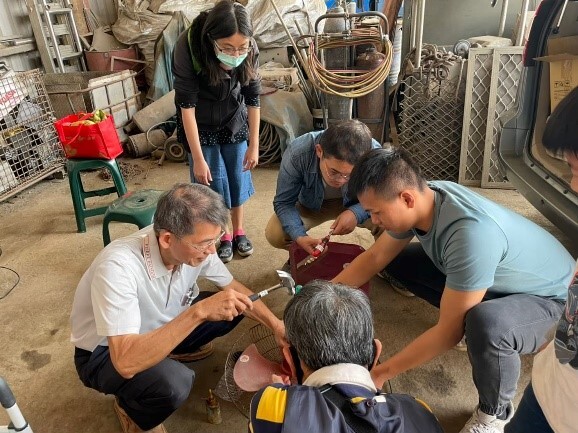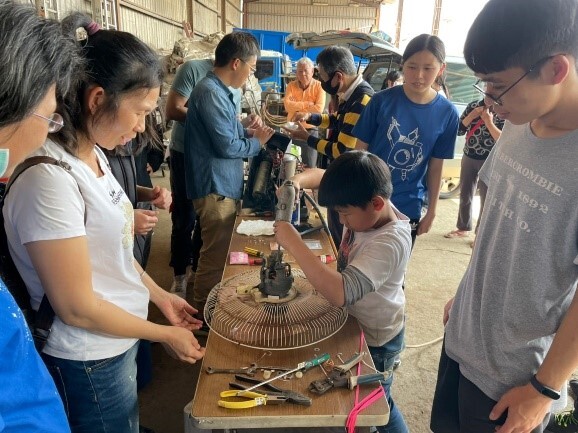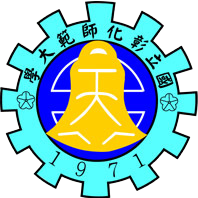SDG1.4.1 Local start-up assistance Year: 2021
To demonstrate the power of change and to allow the growth of sustainable enterprises, NCUE uses relevant academic and government resources to offer training workshops and venues to nurture and develop enterprises. The supportive measures of NCUE are as follows:
1.NCUE combines the strengths of different units to provide enterprises with business diagnoses and problem-solving suggestions.
NCUE’s units, including the Department of Business Administration and the Environmental Education Centre, integrate the resources of academia and industry to form a cross-disciplinary team of teachers who take students to visit enterprises in Central Taiwan. NCUE selects experts from academia to join the teaching teams and hold relevant courses, workshops, and seminars to jointly provide the enterprises with business diagnoses and problem-solving suggestions.
2.NCUE established the Innovation Incubation Centre of the Research and Development Department to promote new ventures and help local enterprises develop AI and green energy.
Innovation Incubation Centre of the Research and Development Department of NCUE actively promotes emerging industries and assists traditional industries in living up to the public nature of higher education and university social responsibility (USR). Moreover, by aligning with national policies of building a diversified platform with the development of such fields as precision machinery, smart electric vehicles, and green energy industries at the core, our institution has established a full-fledged incubation network and has developed profitable local industries. Moreover, our institution helps businesses with sustainable development indices to start and grow through relevant education or resources on the part of our institution. Furthermore, we are committed to deepening industrial cooperation and expanding the benefits of counseling in the Taichung-Changhua-Nantou area by providing long-term assistance in improving the industrial technology aspects of those businesses and assisting companies in obtaining various government subsidies for research and development. The service and improvement goals are as follows:
2.1 The Centre actively cultivates new start-ups and helps transform and upgrade traditional industries, allowing advanced enterprises to lead their counterparts in enhancing the international marketing capabilities. The Centre also helps attract venture capital investments and develops industrial clustering effects in precision machinery, smart electric vehicles, and green energy.
2.2 The Centre establishes an innovative talent cultivation mechanism. Through the executive MBA (EMBA) programmes, innovation MBA (iMBA) programmes, Information Management MBA programmes, technical and vocational education in administrative management, in-service education programmes and doctoral classes, the Centre facilitates interactions between industries and NCUE. This helps the enterprises to nurture talent, gather the forces of operators from the same industry and different industries to expand the Centre’s incubation network, and achieve the effect of entrepreneurs clustering to generate competitive energy and advantages and create business opportunities for production, marketing, and research.
2.3 The Centre brings about horizontal integration of enterprises in the same industries and vertical integration of upstream and downstream suppliers (e.g. resident enterprises and graduated enterprises) to reduce production costs, enhance international competitiveness, helps enterprises create brands for improvements in marketing and technology, and helps enterprises obtain government resources.
2.4 The Centre adheres to national strategies by actively developing such industries as precision machinery, smart electric vehicles, and green energy to foster industrial innovation and promote economic development.
For more about the measures and plans implemented by NCUE’s Innovation Incubation Centre of the Research and Development Department , the Department of Business Administration, and the Environmental Education Centre for the sustainable development of local enterprises, please refer to Annexes 1.4.1A 1.4.1B 1.4.1C.
|
Link to supporting information |
Plan/policy |
Highlights |
|
|
|
Innovation Incubation Centre of the Research and Development Department |
Caring for local industrial parks/Innovation Plans Academia’s Technology Caring Project/Industrial Park-based Industrial Counseling Innovation Project in Support of SME (Please refer to Annex 1.4.1A) |
Care plans: 1. Participating enterprises: 15; experts and scholars: 15; students: 26 2. New products/technology development: 3 cases 3. Technical and talent training courses: 2 sessions 4. Applications for government subsidies: 4 applications (2 approved) for a total of 1.04 million NTD 5. Patent applications and utilisation: 3 cases 6. National contests on special topics: 5 cases Innovation plans: 1. Participating enterprises: 80; experts and scholars: 20 2. Technical coaching: 11 cases 3. Technical and talent training courses: 6 sessions 4. Applications for government subsidies: 2 applications for a total subsidy of 4.653 million NTD 5. Student productions on special topics and national contests on special topics: 6 cases 6. Student internships: 28 people SBIR Program: 5 applications, 3 approved, 2,479,615 NTD in grants |
|
|
|
Department of Business Administration
|
University Social Responsibility (USR) Projects: ‘Shetou Sock Projects: Innovation, Entrepreneurship, Revitalization’ (Please refer to Annex 1.4.1B) |
1. Incubation workshops of various types: 19 2. Built the first USR student volunteers’ club, and led students in establishing the Tavocol e-commerce platform. 3. Tavocol e-commerce platform assisted seven sock manufacturers in their digital transformation and fulfilling their corporate social responsibility by allocating 2% of the proceeds as a corporate social responsibility feedback fund Tavocol e-commerce platform assisted seven sock manufacturers in their digital transformation and fulfilling their corporate social responsibility by allocating 2% of the proceeds as a corporate social responsibility feedback fund. 4. Organized one camping activity for elementary and junior high schools and five courses for vocational high school clubs. 5. Organized charity sales,Fun pass activities and physical examination activities |
|
|
|
University Social Responsibility (USR) Projects: ‘Deep Cultivation in Fangyuan’ and ‘Joining Hands in Dacheng: Changhua Twin Cities’ Industrial and Environmental Sustainability’ (Please refer to Annex 1.4.1C) |
1. Held 52 training sessions (24, 33, or 120 hours long) for environmental educators 2. Conducted four sessions of environmental education staff training with local teachers 3. Held 7 environmental education courses and workshops on solar photovoltaics and green energy 4. Held 15 workshops related to the aquaculture industry and local cooperation 5. Actively nurtured local environmental educators and helped them implement food and agriculture education 6. Established a care team to support industrial sustainable development and held 24 preparatory meetings of experts 7. Held 12 Agri-food education workshops with local community development associations |
|
||
|
|
|
|
|
|
|
|
||||


Photo: Environmental Education Seminar — A Small Home Appliance Seeded Engineer


